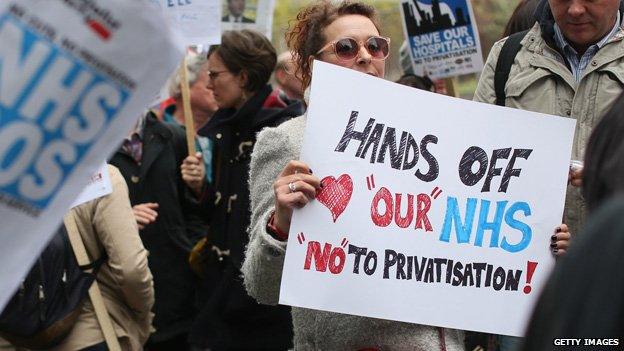Reality Check: Can we trust NHS privatisation statistics?
- Published

It has been one of the most emotive issues of the campaign - to what extent has the NHS in England been "privatised"? And it speaks to a bigger question: who do the public trust when it comes to running the NHS?
Even before the start of the campaign period, the argument over privatisation was rarely out of the headlines. There were campaign groups claiming that the NHS had been put up for sale, and reports of a third of NHS contracts going to private providers.
In response, last year the Department of Health released data which appeared to show that private spend within the NHS had increased at a faster rate under the previous Labour government than under the coalition.
The figures showed that under Labour the percentage of the NHS budget spent on private providers increased from 2.8% in 2006/07 to 4.9% in 2010/11.
For 2013/14, it stood at 6.1%.
This data was not published anywhere on the department's website but was shared with journalists on request. The figures were also quoted in answer to a in December 2014.
The problem with this approach is that we know very little about how the statistics were produced, or whether the numbers have been audited. In short, we don't know how reliable the numbers are or whether there are any important caveats to using them.
The 大象传媒 contacted the UK Statistics Authority (UKSA), the independent watchdog that monitors how official statistics are produced and released, and asked them to look into it. The head of assessment at the UKSA has now .
First of all, the authority noted that - in an example the 大象传媒 provided of the way the numbers were being used - Health Secretary Jeremy Hunt had not quoted the most recent statistics available.
On 15 April he a graph showing the NHS spent only 5.9% of its budget on private providers, when in fact the figure had already been revised upwards to 6.1%.
In the current political environment, talking about small changes in numbers, a difference of 0.2 percentage points could be considered significant.
Looking at the way the statistics were released, the UKSA describes the Department of Health's approach as "unsatisfactory", owing to "the significance that we attach to the principle of equal access to statistics and underlying analysis".
According to the UKSA letter, the Department of Health was satisfied that, after sharing the figures with a number of media outlets and last month's Parliamentary Question, it had made the data publicly available. It also indicated that it would be more "proactive" in future, looking to publish this information "as part of its annual financial statements and report" - something the UKSA said it would welcome.
The UKSA notes that because the statistics in question are financial data (from DH annual accounts), and not from an official statistics publication, its doesn't apply. That code says there should be equal access to data and analysis, and the producers of statistics should provide information about data quality and reliability.
The UKSA suggests that the department, while not bound by the code in this case, could have behaved better: "Voluntary adherence to the spirit and the high standards of the code of practice when publishing numerical analysis not currently designated as official statistics can be beneficial in these and other areas."
While the department says it will improve its reporting of these numbers in future, this is of little use for the voters going to the polls next week.
In a statement, the Department of Health said: "This information is already on the Parliamentary record but we agree there could be more consistency about the way we publish the data, which is why we have decided to publish it in our annual report."
Update: This article has been amended to link to the written answer to the most relevant Parliamentary Question
Election 2015 - Reality Check
What is the truth behind the politicians' claims on the campaign trail? Our experts investigate the facts, and wider stories, behind the sound bites.
Read latest updates or follow us on Twitter